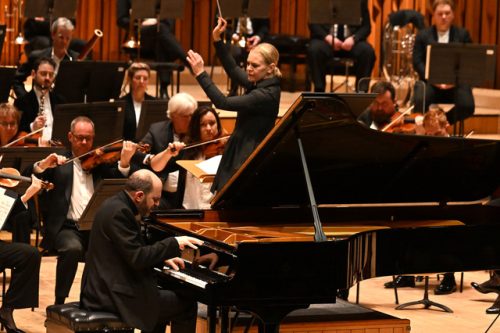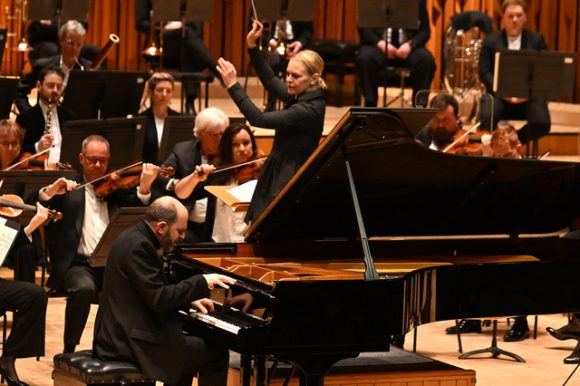 United Kingdom Debussy, Ravel, Scriabin: Kirill Gerstein (piano), Sopranos and Altos of the London Symphony Chorus, London Symphony Orchestra / Susanna Mälkki (conductor). Barbican Hall, London, 3.12.2023. (KMcD)
United Kingdom Debussy, Ravel, Scriabin: Kirill Gerstein (piano), Sopranos and Altos of the London Symphony Chorus, London Symphony Orchestra / Susanna Mälkki (conductor). Barbican Hall, London, 3.12.2023. (KMcD)

Debussy – Three Nocturnes
Ravel – Piano Concerto for the Left Hand
Scriabin – Symphony No.4, The Poem of Ecstasy
Acclaimed Finnish conductor, Susanna Mälkki, was in town to conduct a pair of concerts with the LSO – this being the second where she was joined by Russian-born pianist, Kirill Gerstein, who also happens to be this season’s Spotlight Artist. The choice of repertoire for this well-attended evening of music-making was perfectly judged, bringing together seminal works by Debussy, Ravel and Scriabin.
The epithet ‘impressionism’ is inevitably wheeled out when discussing Debussy’s output, yet it seemed perfectly apt in these circumstances as Mälkki led a ravishing account of his Three Nocturnes. Orchestral colours shimmered languidly in the opening ‘Nuages’ – Mälkki bringing out individual details that one had not heard before, with all sections of the orchestra attentive to every nuance of this kaleidoscopic score.
This is a work of contrasting moods, which Mälkki was at pains to emphasise, no more so than in the effervescent nature of ‘Fêtes’, where she coaxed, rich, iridescent playing, particularly from the trumpets and harps, perfectly catching the movement’s dance-like qualities. ‘Sirènes’ concludes the work, where Debussy introduces a wordless chorus, made up solely of sopranos and altos, which is designed to evoke the sea and the mysterious song of the sirens ‘as they laugh and pass on’. Again, Mälkki captured the ebb and flow to perfection, and the chorus, expertly coached by chorus director Mariana Rosas, was at turns eerie and seductive.

Ravel’s Piano Concerto for the Left Hand was commissioned by Paul Wittgenstien, who lost his right arm fighting in the Austrian army in the early months of World War I. It is a work that is fiendishly difficult from a technical point of view, and one where the soloist is required to shift through a gamut of emotions within a relatively short space of time – the work lasts 18 minutes and is written in one movement. Gerstein’s playing was hugely impressive, as his razor-sharp technique never faltered, and he was able to adapt to the shifting moods with ease. There was a sense of joy and abandonment in the way he approached this challenging part, bringing a filigree lightness to the unaccompanied passages, whilst not shying away from a more assertive attack when pitted against the orchestra. Mälkki ensured perfect balance between the two – in a work so richly scored there is always the danger that the orchestra will overwhelm the soloist, but not here.
For an encore, Gerstein was joined by concertmaster Roman Simovic in the second movement of Ravel’s Violin Sonata. They both threw themselves into the piece, which is suffused with the Blues, and caught the essence of the work to a tee.
After the interval we were treated to an explosive performance of Scriabin’s Symphony No.4, The Poem of Ecstasy. Although this is a 25-minute, single-movement work, it is scored for a large orchestra – no less than 21 brass players, 6 percussionists, and an organ thrown in for good measure – so requires a conductor who can marshal these large forces, keep the orchestral lines lucid, and mould the work organically, while keeping an eye on the volume. Mälkki managed all three – allowing solos lines to come to the fore and keeping the textures crystal clear – which is no mean feat in a work that can easily descend into bombast. This was as viscerally exciting a performance of this strange, enigmatic piece that we have heard in the concert hall. Every section of the orchestra played out of their skins for her, and while it may seem invidious to single out anyone from such a resounding team effort, James Fountain’s exemplary trumpet playing was the stuff of legend. Scriabin allocates the main rising and falling theme of the work to the trumpet, which appears regularly, and is notoriously difficult to play, yet Fountain rose to the challenge each time.
Mälkki wasn’t afraid to shy away from allowing the orchestra its head in the closing bars, bringing the work to its exhilarating and shattering climax. Pitch-perfect playing, from an orchestra at the very top of its game, under a conductor who definitely brings out the best in them – this was a fabulous evening of music-making.
Keith McDonnell
